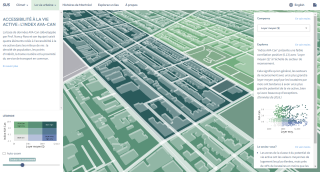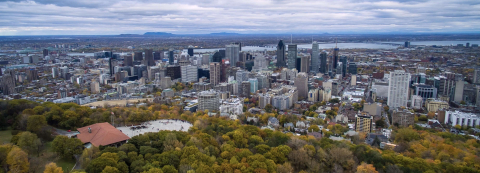About
Roughly half of the global population lives in urban areas, a number that is projected to increase to 70% by 2050. These urban areas are central to our transition towards sustainability — while they stand to bear the brunt of the environmental crisis, they offer great opportunity to shift to more sustainable trajectories.
The Adapting Urban Environments theme pursues critical research on urban sustainability across scales – from the neighbourhoods and cities we live in, to the national policies and global networks that inform and influence decision-making. Questions include what sustainable cities look like, how and at what scale we can best measure the impacts and benefits they provide to both residents and the natural environment, and how things like “smart cities” and “big data” can contribute to urban sustainability.
This research is generating solutions that improve the monitoring, planning and governance of urban sustainability. This is critical in the light of the many constraints on cities’ development and looming uncertainties about the future climate and economy.
Theme co-Leads

Andrew Gonzalez
Biology
Kevin Manaugh
Geography, Bieler School of Environment
David Wachsmuth
Urban Planning
Research Projects
- Sus: An Urban Sustainability Explorer for Montreal
- Local Politics of Global Sustainability
- Sustainable Neighbourhoods
- Walkability in Indian Master-Planned Cities
- The Impacts of Urban Growth on Biodiversity and Ecosystems
- PRISM
- New Opportunities Fund
Curbcut: A platform for deep, dynamic, and intuitive exploration of urban sustainability

Urban governance, including decision making related to sustainability problems, must balance competing voices and visions over multiple spatial and temporal scales. Curbcut—an online platform for integrating sustainability data and enabling complex scenario modelling—addresses these challenges, transforming decision-making processes using a range of data sources integrated into meaningful relationships. Curbcut takes an interdisciplinary approach to urban sustainability by examining elements of the natural, built, and social environments and putting environmental and distributional justice as a key focus. The Curbcut team was recently awarded the Canadian Open Data Excellence Award by Geomatics Canada. Lead researchers: Kevin Manaugh, David Wachsmuth, Andrew Gonzalez.
- Geographic versus institutional drivers of nitrogen footprints: A comparison of two urban universities. Environmental Research Letters, 2020. See open access paper
- Research gaps in knowledge of the impact of urban growth on biodiversity. Nature Sustainability, 2020. See paper
- From Transportation Equity to Transportation Justice: Within, Through, and Beyond the State. Journal of Planning Literature, 35(4), 440–459. Read more.
The Local Politics of Global Sustainability
This project investigates the circumstances under which local governance actors take action to address global sustainability challenges. The primary case studies used are 100 Resilient Cities, a global interlocal policy network funded by the Rockefeller Foundation, and complete sets of local climate action plans in Canada and the State of California. Lead researcher: David Wachsmuth.
- Sustainable urban governance and the urban governance of sustainability. In Governing the Plural City, British Academy, 2019. See chapter
- Why does everyone think cities can save the planet? Urban Studies, 2020. Read more.
Sustainable Neighbourhoods
This project identifies Canadian neighbourhoods across the sustainability spectrum and targets contrasting neighbourhoods for social surveys to identify behavioural patterns around consumption (energy, transportation, food). This research will help us better understand the relationship between structural and behavioural sustainability. Lead researchers: Kevin Manaugh, Mylene Riva, Nancy Ross.
Walkability in Indian master-planned cities
This is a collaboration with FLAME University in Pune, India to study walkability across urban gradients in India, including new master planned cities and “Smart Cities”. This project also takes a critical look at whether and how conceptions of ‘walkability’ (which were developed to describe conditions in North American urban environments) can be adjusted to work in other contexts with vastly different conditions, legacies of built form, and social norms around transport behaviour. It includes a comparative study between Pune, India and Montreal, Canada. Lead researchers: Kevin Manaugh, Sarah Moser, Raja Sengupta.
The Impacts of Urban Growth on Biodiversity and Ecosystems
This project is assessing the effects of urban growth as a major driver of terrestrial habitat loss. Estimates from the Nature in the Urban Century Assessment suggested that urban growth will have impacted 290,000 km2 of natural habitat between 2000 and 2030, with much of it concentrated in biomes that have high terrestrial species richness and endemism. This project is creating a global time-series of urban-caused habitat loss and fragmentation, describing the state of the remaining habitat near urban areas for the 100 largest cities in the world, and measuring the connectivity of remnant habitat patches to one another. This project includes a collaboration with The Nature Conservancy, QCBS, Liber Ero Chair, and MSSI. Lead researcher: Andrew Gonzalez.
- Landscape modification and nutrient-driven instability at a distance. Ecology Letters, 2021. Read more.
PRISM
The Panama Research and Integrated Sustainability Model, led by Brian Leung in the Department of Biology, is a national level, integrated model of natural and human assets that is being developed to enable sustainability research as well as evidence-based decision making. Lead researcher: Brian Leung.
- A Critical Review on Mathematical Descriptions to Study Flux Processes and Environmental-Related Interactions of Mangroves. Sustainability, 2021. See open access paper
- Drivers of future alien species impacts: An expert-based assessment. Global Change Biology, 2020. Read more.
New Opportunities Fund
The New Opportunities fund supports urban sustainability research projects by McGill faculty. Below are previously funded projects.
See past New Opportunities Fund projects
2019
Urban Heat Wave Vulnerability Index (UHWVI): extending the Urban Heat Island (UHI). Project leads: Raja Sengupta, Department of Geography and Frederic Fabry, Department of Atmospheric and Oceanic Sciences.
- Montreal’s environmental justice problem with respect to the urban heat island phenomenon. The Canadian Geographer, 2021. Read more.
Linking Disability Rights and Climate Resilience in Urban Environments. Project leads: Sébastien Jodoin, Faculty of Law; Matthew Hunt, Faculty of Medicine; and Nandini Ramanujam, Faculty of Law.
Methane Emissions from Natural Gas Distribution Pipelines and Infrastructure in Montreal. Project lead: Mary Kang, Department of Civil Engineering.
Sustainable Consumption: The Full Consumption Cycle from the Consumers’ Perspective. Project lead: Emine Sarigöllü, Desautels Faculty of Management.
2018
From a Throwaway Society into a Sustainable Society: A Consumer Perspective. Project leads: Emine Sarigöllü and Myung-Soo Jo, Desautels Faculty of Management.
- Feelings of satiation as a mediator between a product’s perceived value and replacement intentions. Journal of Cleaner Production, 2020. See open access paper.
- Stepping outside the self promotes pro-environmental behaviors. Sustainability (Switzerland), 2018. See open access paper.
Trajectories of Inequality in Montreal: What neighborhoods stand to benefit most from the proposed ‘Pink’ metro line? Project lead: Sebastien Breau, Department of Geography.
Light, Night and Urban Sustainability. Project lead: Will Straw, Department of Art History & Communication Studies.

